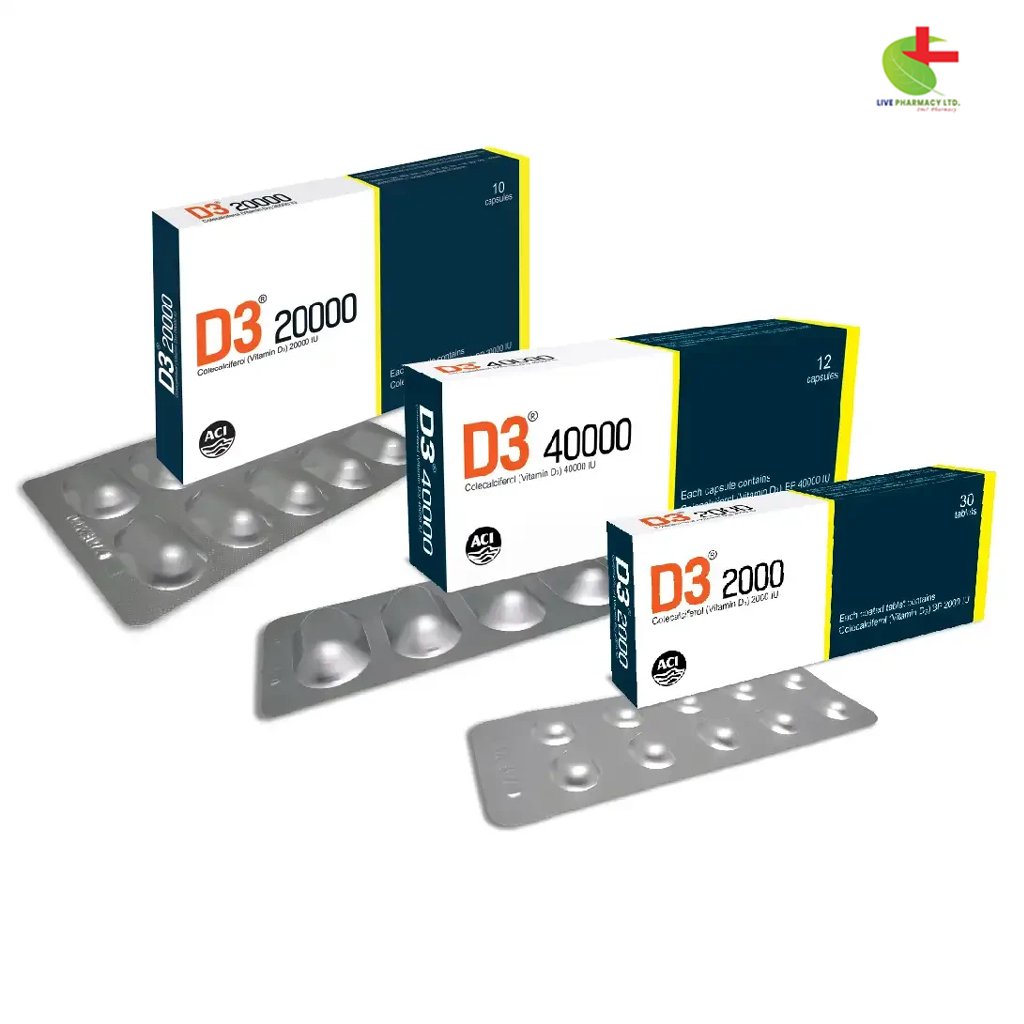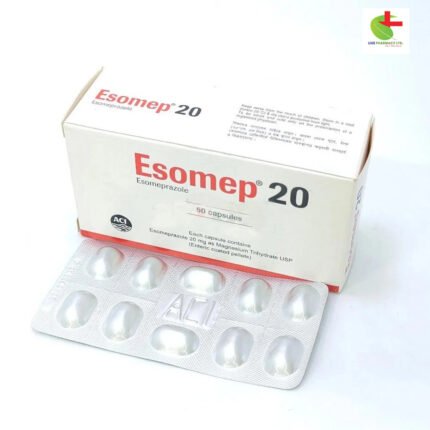D3-40000
140.00৳ Strip
- Vitamin D3 supplement helps prevent and treat Vitamin D deficiency.
- Supports healthy bones, teeth, and immune function.
- Ideal for individuals with limited sun exposure, poor diet, or specific health conditions.
- Promotes calcium absorption and helps prevent diseases like rickets and osteoporosis.
- Available in capsules, tablets, syrup, and injections for both adults and children.
- Always consult a healthcare professional for proper dosage.
 Brand
Brand
|
ACI Limited |
|---|---|
 Generics
Generics
|
Cholecalciferol [Vitamin D3] |
 Type
Type
|
Capsule |
Indications for Use
- Vitamin D3 Deficiency: Individuals with limited sunlight exposure or those whose diet lacks sufficient Vitamin D3 may experience deficiency.
- Bone and Dental Health: Vitamin D3 is crucial for the absorption of calcium and phosphate, supporting strong bones and teeth. It helps prevent conditions like rickets, osteomalacia, and osteoporosis.
- Pregnancy and Lactation: Vitamin D3 is important during pregnancy to reduce the risk of pre-eclampsia and ensure proper nutrition for both the mother and developing infant.
- Immune Health: Vitamin D3 plays a significant role in boosting immune system function.
Note: Always follow the advice of a registered healthcare professional before taking this medication.
Pharmacology
Vitamin D3, in its active form (Calcitriol), interacts with Vitamin D receptors (VDRs) present in various body tissues. Due to its fat-solubility, Vitamin D3 has a half-life of approximately 50 days.
- Absorption: It is absorbed in the small intestine, binds to specific α-globulins, and is transported to the liver, where it is converted to 25-hydroxy Vitamin D3 (Calcidiol).
- Metabolism: A second conversion occurs in the kidneys to 1,25-dihydroxy Vitamin D3 (Calcitriol), which enhances calcium absorption.
- Storage and Elimination: Excess non-metabolized Vitamin D3 is stored in fat and muscle tissues, while it is eliminated primarily through feces and urine.
Dosage & Administration
For Capsules:
- Adults:
- Treatment of Vitamin D3 Deficiency: 40,000 IU weekly for 7 weeks. Maintenance dose: 1,400-2,000 IU/day. Check 25-hydroxy Vitamin D levels after 3-4 months to assess treatment success.
- Prevention: 20,000 IU every 4 weeks. Higher doses may be needed in certain cases.
- Osteoporosis Support: 20,000 IU once a month.
- Children (Ages 12-18):
- Treatment: 20,000 IU every 2 weeks for 6 weeks.
- Prevention: 20,000 IU every 6 weeks.
For Tablets (Film-Coated, 1000 IU per tablet):
- Adults: 1-2 tablets daily or as prescribed. Take with food or within 1 hour after eating.
For Chewable Tablets (Oroflash):
- Adults: 1,000 to 2,000 IU daily, or as directed. Chew before swallowing, ideally after a meal.
For Syrup:
- At Risk for Deficiency:
- Infants (0-1 year): 400 IU/day (2 ml)
- Children (1+ years): 600 IU/day (3 ml)
- For Deficient Patients:
- Infants (0-1 year): 2,000 IU/day + 50,000 IU/week for 6 weeks.
- Children (1-18 years): 2,000 IU/day for 6 weeks.
For Injection:
- Prevention:
- Infants on Vitamin D-enriched milk: ½ ampoule (0.5 ml) every 6 months (100,000 IU).
- Infants not on Vitamin D-enriched milk & children up to 5 years: 1 ampoule (1 ml) every 6 months (200,000 IU).
- Adolescents & Adults: 1 ampoule (1 ml) every 6 months during winter.
- Pregnancy: ½ ampoule (0.5 ml) from the 6th or 7th month of pregnancy.
- Elderly: ½ ampoule (0.5 ml) every 3 months.
For Vitamin D Deficiency:
- Adults: 1 ampoule (1 ml, 200,000 IU) with repeat dosing as advised by a healthcare provider.
Note: Always consult a registered healthcare professional for appropriate dosage and usage.
Drug Interactions
Several medications may reduce Vitamin D3 effectiveness by interfering with its absorption or metabolism. These include:
- Magnesium-containing antacids
- Digoxin, Thiazide diuretics
- Cholestyramine, Cholestipol
- Phenytoin, Phenobarbital, Orlistat
- Mineral oil, Corticosteroids like Prednisolone
Consult your healthcare provider if you’re on any of these medications.
Contraindications
Vitamin D3 should not be used in:
- Patients with hypercalcemia or hypersensitivity to Vitamin D3 or its components.
- Individuals with known Vitamin D3 toxicity.
Side Effects
While rare, potential side effects may include:
- Loss of appetite
- Nausea, vomiting
- Diarrhea or constipation
- Weight loss
- Excessive urination, sweating, headache
- Increased calcium and phosphate levels in blood or urine
Use During Pregnancy & Lactation
- Pregnancy: Doses up to 4,000 IU have been shown to be safe. The recommended intake is 400 IU/day, though higher doses may be necessary for deficient women. Always consult your doctor.
- Lactation: Vitamin D3 and its metabolites are passed into breast milk, but no adverse effects from overdose in breastfed infants have been reported. If additional Vitamin D3 is prescribed for an infant, consider the mother’s intake as well.
Precautions & Warnings
- Regular monitoring of plasma calcium levels is advised for high-dose Vitamin D3 use, especially in those with renal issues or during pregnancy.
- Consult your healthcare provider if you have any of the following:
- Liver or kidney disorders
- Hyperthyroidism
- Lymphoma, tuberculosis, or granulomatous diseases
- People on medications like Digoxin or Thiazide diuretics should seek medical advice before starting Vitamin D3 supplements.
Use in Special Populations
The safety and efficacy of Vitamin D3 in children under 12 years have not been established.
Overdose Effects
Excessive Vitamin D3 intake can result in hypervitaminosis D, leading to elevated calcium levels and related complications.
Storage Conditions
- Store at temperatures below 30°C, protected from light and moisture.
- Keep out of reach of children.
Therapeutic Classification
- Vitamin D preparations for bone health and calcium absorption.













Reviews
There are no reviews yet.